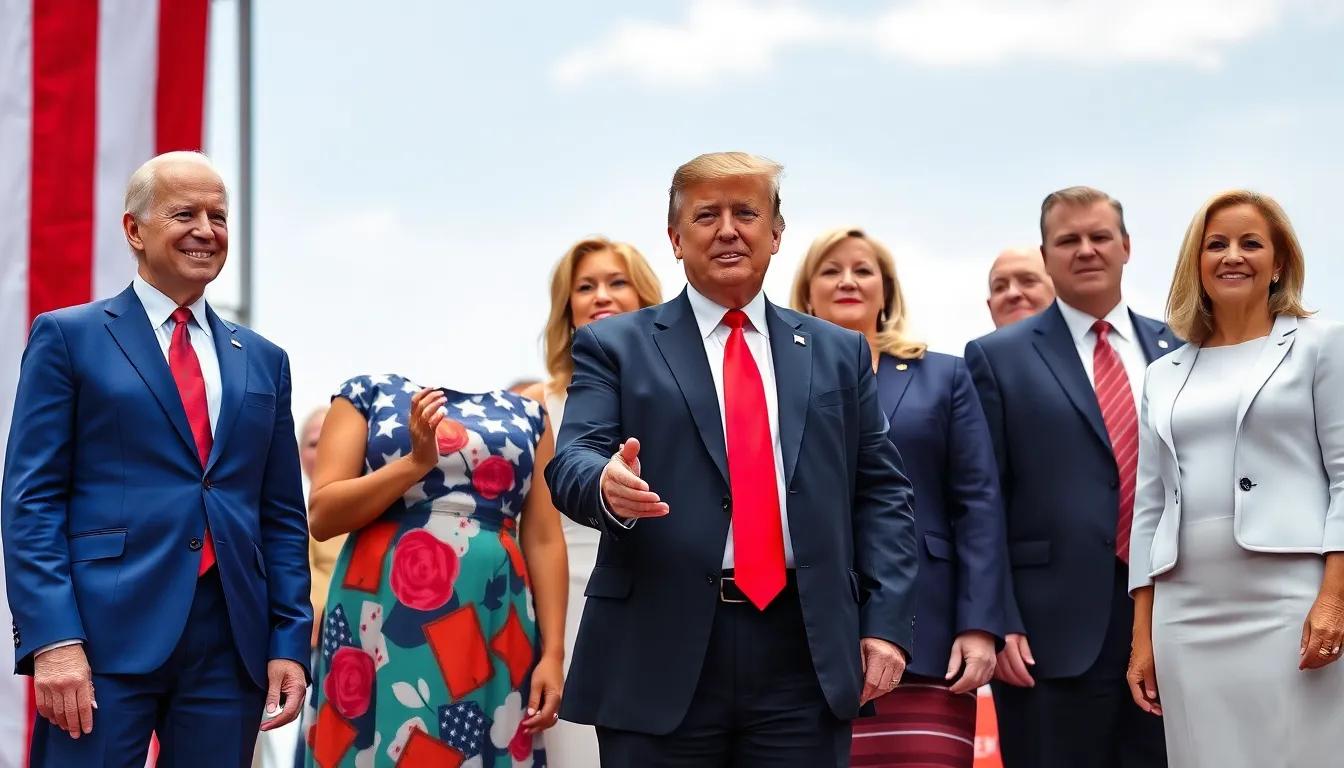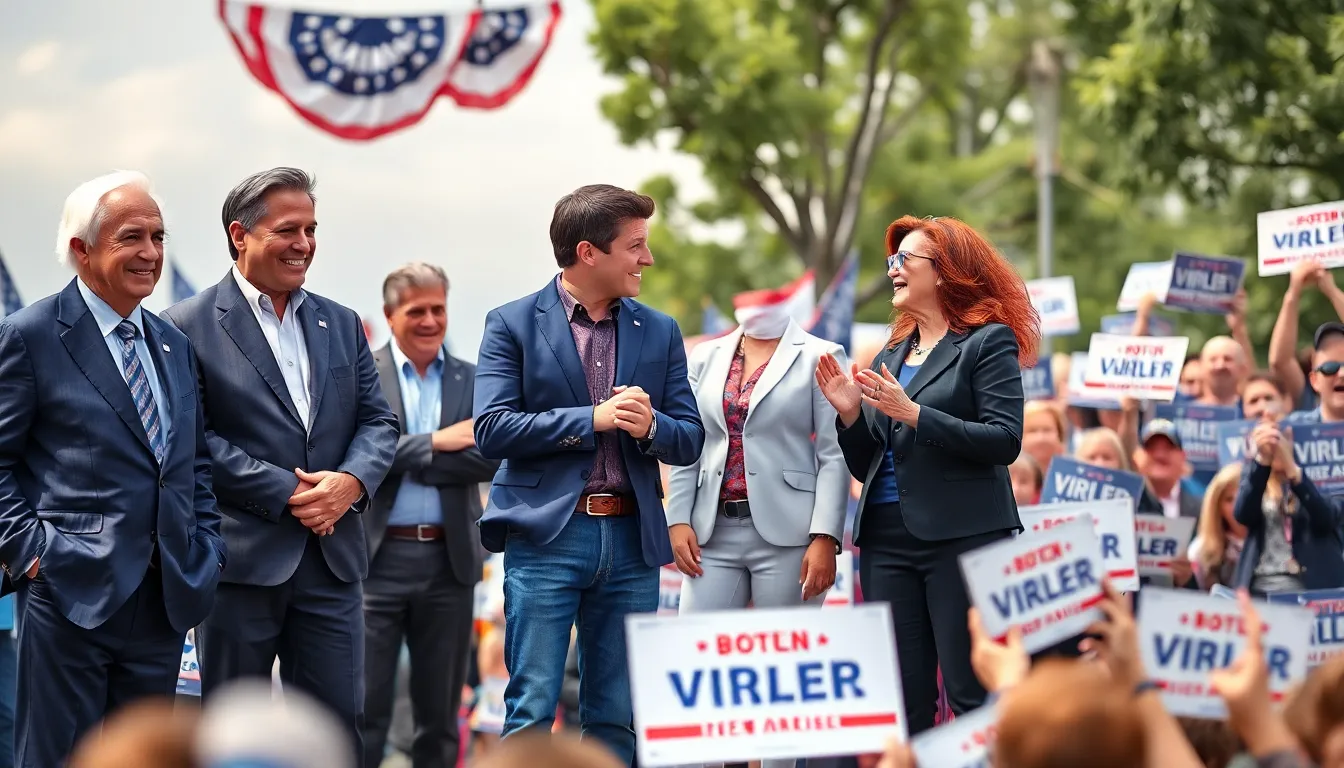As the 2024 presidential election approaches, the political landscape is buzzing with potential candidates and their ambitions. Voters are eager to know who will step up to lead the nation, and the race is shaping up to be one of the most intriguing in recent history. With both established politicians and fresh faces entering the fray, the competition promises to be fierce.
From seasoned incumbents to dynamic newcomers, each contender brings unique perspectives and policies to the table. As campaigns kick off and debates heat up, it’s essential to stay informed about who’s running and what they stand for. This election could redefine the future of American politics, making it crucial for voters to engage and understand the stakes involved.
Table of Contents
ToggleOverview of Presidential Candidates
The 2024 presidential election features a diverse array of candidates. Each candidate comes with distinct backgrounds and policy proposals, shaping the political landscape. Key candidates include:
- Joe Biden: The incumbent president seeks re-election, promoting his legislative achievements and economic recovery efforts from the COVID-19 pandemic.
- Donald Trump: The former president aims for another term, focusing on immigration reform, tax cuts, and a strong stance on foreign policy.
- Nikki Haley: The former UN Ambassador and South Carolina governor offers foreign policy experience and advocates for conservative economic policies.
- Ron DeSantis: The Florida governor emphasizes his approach to COVID-19, education reform, and tax policies, positioning himself as a champion of individual freedoms.
- Vivek Ramaswamy: The entrepreneur and political newcomer promotes anti-woke policies and a platform focused on uniting Americans against divisive issues.
- Robert F. Kennedy Jr.: This environmental attorney and vaccine skeptic challenges both major parties, emphasizing transparency and accountability in government.
- Cornel West: The academic and activist runs as a Green Party candidate, prioritizing social justice and systemic reform in economic and health policies.
These candidates reflect a broad spectrum of ideologies, creating an energized primary season. Voters should examine the candidates’ platforms and past actions to make informed decisions as the election approaches.
Major Candidates

The 2024 presidential election features a diverse lineup of candidates representing both major parties, each with distinct platforms and backgrounds.
Democratic Party Nominees
Incumbent President Joe Biden seeks re-election, highlighting achievements in infrastructure and pandemic recovery. He positions his administration’s economic gains and legislative successes against ongoing challenges. Marianne Williamson, a progressive author and activist, campaigns on a platform of universal healthcare and robust climate action. These candidates reflect the Democratic Party’s ongoing efforts to address socio-economic disparities and climate change.
Republican Party Nominees
Former President Donald Trump remains a leading candidate, promoting immigration reform, tax cuts, and America-first policies. Florida Governor Ron DeSantis emphasizes individual freedoms and education reform, appealing to conservative voters. Nikki Haley focuses on conservative economic policies and national security, advocating for a strong U.S. presence on the global stage. Additional candidates like Vivek Ramaswamy present anti-woke policies designed to resonate with the Republican base. Each nominee offers unique perspectives that shape the party’s direction in the upcoming election.
Third-Party Candidates
Third-party candidates often play a crucial role in shaping the political landscape during elections. For the 2024 presidential election, several candidates from outside the two major parties are emerging.
- Robert F. Kennedy Jr.: Running as an independent, Kennedy focuses on challenging the established norms of both major parties. His campaign highlights issues like public health, environmental protection, and civil liberties.
- Cornel West: Representing the Green Party, West prioritizes social justice, economic equity, and anti-war policies. His platform appeals to voters dissatisfied with mainstream party offerings.
- Jill Stein: Also with the Green Party, Stein advocates for renewable energy, healthcare as a right, and reducing military spending. Her proposals seek to address climate change and improve social welfare.
- Mike Ter Maat: As a candidate for the Libertarian Party, Ter Maat emphasizes personal freedoms, limited government, and fiscal responsibility. His platform targets reducing regulations and promoting individual rights.
- Chase Oliver: Running as a Libertarian candidate, Oliver focuses on criminal justice reform, LGBT rights, and reducing government intervention. His campaign aims to resonate with socially progressive voters looking for new solutions.
These candidates provide alternative perspectives and are poised to influence the conversation leading up to the election. Voters exploring these options can find new approaches to traditional issues, fostering a broader dialogue about the future of American politics.
Key Issues in the 2024 Election
Economic policy stands as a central theme in the 2024 election. Candidates propose various solutions to address inflation, job growth, and taxation. Joe Biden promotes infrastructure investments to stimulate the economy, while Donald Trump emphasizes tax cuts and deregulation as means to foster growth. Nikki Haley advocates for fiscal responsibility and reducing government spending.
Healthcare remains a critical issue as well. Marianne Williamson champions universal healthcare, arguing for its necessity amid rising costs. Robert F. Kennedy Jr. focuses on public health and access to medical treatments, citing the impact of the pandemic on healthcare systems. Voters need to assess candidates’ positions on these vital healthcare matters.
Climate change occupies a prominent spot in the 2024 debate. Candidates like Cornel West and Jill Stein push for aggressive climate policies, highlighting renewable energy and sustainability. In contrast, Ron DeSantis emphasizes economic impacts and individual freedoms over stringent climate regulations. The differing approaches reflect broader national attitudes towards environmental responsibility.
Social justice and civil rights influence candidate platforms in this election. Candidates like Cornel West prioritize issues of racial equality and systemic injustice, while others, like Vivek Ramaswamy, focus on combating what he terms “woke culture.” Voters must consider how these issues resonate with their values and expectations for equitable progress.
Foreign policy becomes increasingly relevant as international relations evolve. Candidates debate strategies regarding China, Russia, and military involvement abroad. Trump advocates for an “America First” stance, favoring reduced global engagement. Conversely, candidates like Nikki Haley argue for a robust international presence to maintain global stability.
Voter rights and election integrity emerge as significant topics amid controversy surrounding past elections. Candidates are divided; some support expanding access to voting, while others push for stricter regulations. Understanding candidates’ views on voter access is essential for a fair democratic process.
As the election approaches, these key issues shape the political discourse. Voters must analyze candidates’ policies to ensure their preferred issues are addressed in future governance.
Candidate Profiles
This section details the backgrounds and campaign strategies of key candidates in the 2024 presidential election.
Background and Experience
- Joe Biden: Incumbent President, Biden’s extensive political career includes serving as Vice President from 2009 to 2017 and as a Delaware Senator for 36 years. His administration focuses on infrastructure and pandemic recovery.
- Donald Trump: Former President from 2017 to 2021, Trump is a businessman and media personality. His administration prioritized immigration reform and tax reductions.
- Nikki Haley: Former U.N. Ambassador and Governor of South Carolina, Haley emphasizes her foreign policy experience and conservative governance, advocating for economic policies and national security.
- Ron DeSantis: Governor of Florida since 2019, DeSantis is known for his stances on education reform and individual freedoms, particularly during the pandemic.
- Vivek Ramaswamy: A political newcomer and entrepreneur, Ramaswamy presents himself as a champion of anti-woke policies and seeks to appeal to disillusioned voters.
- Marianne Williamson: Author and activist, Williamson’s platform focuses on universal healthcare and climate change, positioning herself as a progressive voice within the campaign.
- Robert F. Kennedy Jr.: An environmental attorney, Kennedy runs as an independent, advocating for public health and civil liberties, challenging the traditional two-party system.
- Cornel West: An academic and Green Party candidate, West emphasizes social justice and equity, advocating for policies addressing systemic inequality.
Campaign Strategies
- Joe Biden: Biden’s campaign strategy focuses on promoting legislative achievements. His messaging highlights infrastructure investments and pandemic recovery efforts to attract moderate voters.
- Donald Trump: Trump’s campaign relies on his “America First” rhetoric, emphasizing immigration reform and tax cuts to energize his base.
- Nikki Haley: Haley employs a strategy of presenting herself as a capable leader on national security, targeting voters concerned about global and domestic threats.
- Ron DeSantis: DeSantis utilizes a campaign strategy that promotes individual liberties and educational changes, appealing to conservative voters through cultural issues.
- Vivek Ramaswamy: Ramaswamy’s approach combines business acumen with a focus on cultural critiques, leveraging his outsider status to attract younger, disenchanted voters.
- Marianne Williamson: Williamson emphasizes grassroots campaigning, leveraging personal engagement and social media to promote her progressive platform centered on empathy and reform.
- Robert F. Kennedy Jr.: Kennedy aims to resonate with voters seeking authenticity by challenging mainstream narratives on public health and environmental issues.
- Cornel West: West’s strategy includes mobilizing grassroots support through conversations around social justice and environmental sustainability, engaging voters on deep societal issues.
The 2024 presidential election is shaping up to be a pivotal moment in American politics. With a diverse array of candidates presenting varied platforms on key issues like the economy healthcare and social justice voters face a crucial choice. The presence of third-party candidates adds another layer of complexity to the race offering alternative viewpoints that could sway the political landscape.
As the campaigns progress and debates heat up it’s essential for voters to remain engaged and informed. Understanding each candidate’s background and proposed policies will empower individuals to make decisions that align with their values and priorities. The outcome of this election will undoubtedly have lasting implications for the nation’s future.



